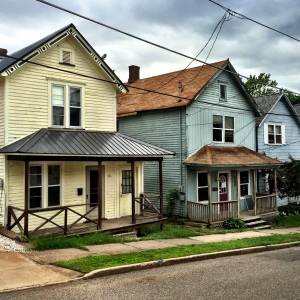Michigan Quarterly Update: January – March 2021
April 15, 2021

This quarterly update from Community Progress’ Michigan Initiatives team highlights important revitalization news and resources from across the state. For specific inquiries or to share how your community is addressing vacant, abandoned, and deteriorated properties, email Payton Heins, Director of Michigan Initiatives at [email protected]
ARPA will send much-needed relief to local recovery efforts
While Michigan communities wait for U.S. Treasury guidance on funding use and reporting requirements for the local aid provided in the American Rescue Plan Act, city and county community and economic development, housing, and land bank leaders should begin thinking about how this local aid could support both immediate and long-term community stabilization and revitalization goals.
Michigan cities and counties, set to receive an estimated $2.468 and $1.937 billion respectively, may identify a range of existing programs or entities, such as land banks or nonprofit partners, to scale up through additional funding. Or they may explore creating new programs such as property repair, property rehabilitation, rental, mortgage, or property tax assistance.
To address the wide-ranging impacts of COVID-19 and support the long-term stability of our communities, local leaders should be thinking about how to prevent additional property deterioration and vacancy by answering some critical questions:
1. Keep property owners financially stable to avoid displacement and prevent future vacancy:
- Are commercial property owners, landlords, or homeowners struggling to pay property taxes or make mortgage payments given a decline or loss in income or revenue?
- Will the CARES Act and ARPA relief reserved for rental, mortgage or property tax assistance provide adequate relief to prevent foreclosures or is more support needed?
2. Invest in commercial and residential property repair to prevent further deterioration and ensure safe conditions:
- Are commercial property owners, landlords, or homeowners struggling financially to maintain safe, quality housing and building stock? Have COVID-19 economic impacts exacerbated this issue?
3. Support local entities that play a central role in furthering property improvement, housing, economic development, and community stability goals:
- Does the community’s code enforcement, housing and community development, and other departments critical to ensuring properties are adequately maintained or repaired have sufficient funding? Have these departments seen a cut in funding and staff due to COVID-19?
- Does the community’s land bank authority, playing a central role in stabilization efforts, have adequate funding to meet current and future needs? Has it lost funding and reduced staffing given COVID-19 related budget cuts?
- Are the community’s nonprofits that support property repair, cost-saving energy efficiency improvements, housing stability, and other critical needs adequately funded?
See the Michigan Municipal League’s legislative blog for regular ARPA updates and Community Progress’s COVID-19 Resource Center for an interactive map of estimated allocations by Michigan city or county.
Reinvesting in our existing housing stock – the need for repair and rehabilitation assistance
Many Michigan communities have identified the repair of existing housing stock as a critical need. Community leaders have cited the importance of financial assistance to homeowners and rental property owners through grants, loans, or other forms of support. The need for financial support for property repairs was a concern raised in a 2020 Community Progress survey to code enforcement staff, through Community Progress’s technical assistance engagements across the state, and in strategic planning efforts for the Michigan Statewide Housing Plan (MSDHA).
Addressing repair needs in Flint
Recognizing the importance of repair assistance, community leaders in Flint established the Flint Home Improvement Fund earlier this year. Managed by Genesee County Habitat for Humanity, this collaborative effort brings together support from the Charles Stewart Mott Foundation, Community Foundation of Greater Flint, MSHDA, City of Flint, the Genesee County Land Bank and other community leaders.
Upcoming learning opportunity
Community Progress will be leading a webinar on property repair assistance needs, how communities are responding to those needs, and will feature a variety of home repair grant and loan program examples from the city of Philadelphia. Register here for: Prioritizing Repair Support for Financially Struggling Property Owners on Thursday, April 22.
Michigan Revitalization in the News
New Creamery apartments in Kalamazoo’s Edison Neighborhood shows the issues of affordable housing Kalamazoo County Land Bank and local leaders turn a community vision into reality with this mixed-use affordable housing development. Read more.
New program gives Flint residents funding to renovate, improve homes The Charles Stewart Mott Foundation, Community Foundation of Greater Flint, Genesee County Habitat for Humanity, MSHDA, City of Flint, the Genesee County Land Bank and other community leaders collaborate to form the Flint Home Improvement Fund. Read more.
Two families breathing new life into an historic neighborhood on Bay City’s East Side The Bay County Land Bank helps pave the way for homeowner-led rehab in Bay City. Read more.
Habitat for Humanity delivers first home in Oden Northwest Michigan Habitat for Humanity and the Emmet County Land Bank create new affordable housing options in northern Michigan. Read more.
Proposal N Neighborhood Improvement Project gets green light with sale of first $175 million in bonds Plans in Detroit to secure or rehabilitate 8,000 homes and demolish another 8,000 move forward with the sale of general obligation bonds under Proposal N, passed by Detroiters last November. Read more.
Michigan Revitalization Resources
- Revitalization in Michigan: A Guide to Transforming Vacant, Abandoned, and Deteriorated Properties through Code Enforcement. Download here.
- Michigan State of Vacancy Report, 2020. Download here.
- Michigan Municipal League Blog, Inside 208. Sign up here.
- Michigan Statewide Housing Plan (MSHDA). Read more.
Subscribe to join 14,000 community development leaders getting the latest resources from top experts on vacant property revitalization.

